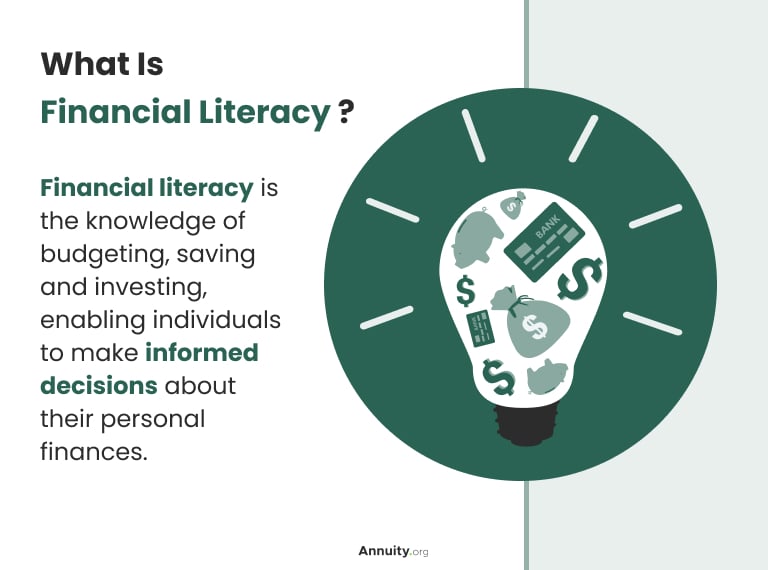
Key Takeaways
- Financial literacy is the ability to make wise decisions with your money.
- The five principles of financial literacy are earning, saving, borrowing, spending and protecting assets.
- Financial literacy helps you make better financial decisions and improves overall financial well-being.
- Financial literacy skills include finding, understanding and using resources for informed decision-making.
- Developing financial literacy skills promotes financial self-sufficiency and stability.
What Is Financial Literacy?
Financial literacy is the ability to understand the use of money as it applies to your personal finances, according to the National Financial Educators Council.
It can help you make better decisions and is a key element in improving your behavior and planning when it comes to your personal finances and overall financial wellness.
Financial Literacy Skills
Financial literacy skills include an ability to find, understand and use resources and information to help you make informed decisions about your personal finances, according to the American Institutes for Research.
Having these skills can provide the confidence, knowledge and ability to make solid financial decisions. Financial literacy skills promote financial self-sufficiency, stability and well-being.
Why Is Financial Literacy Important?
Financial literacy is important because it empowers you to make informed and responsible financial decisions. It helps you understand concepts like budgeting, saving, investing and debt management.
It allows you to make better decisions through problem-solving, critical thinking and having a grasp of essential facts and concepts related to basic personal finance.
Building your financial literacy helps you create a secure future, avoid financial pitfalls and achieve your financial goals.
The 5 Principles of Financial Literacy
There are five principles of financial literacy:
- Earning
- Saving and investing
- Borrowing and managing your debt
- Spending and planning
- Protecting your assets
These principles of financial literacy serve as a road map for good money management and are the establishment of a solid financial foundation. Learning about them — and putting them into practice — can improve your financial situation now and in the future.
Earn
Your income is the foundation of your personal finances. It is the basis for your lifestyle and your financial future.
Implementing the Principle
- Learn to live within your means and pay for your lifestyle without excessive debt.
- Manage your income and workplace benefits.
- Take advantage of employer matches for your 401(k) or similar retirement plans.
- Find ways to put aside portions of your income for the future.
- Set up automatic retirement plan contributions so you won’t be tempted to skip a contribution toward your retirement.
Saving and Investing
Creating a budget will help you put aside money for savings and investments. This allows you to grow your wealth and can empower you to make major financial plans such as buying a house or paying for retirement.
Implementing the Principle
- Monitor where your money is going each month.
- Cut out optional expenses for things you can live without and put the money into savings or investments such as an IRA, investment fund or annuity for retirement.
- Create separate categories or “buckets” in which you can set money aside for specific goals from holiday presents to vacations to home purchase to retirement.

Get Your Free Guide to Annuities
Borrowing and Debt Management
Borrowing wisely will allow you to make major purchases while building your credit. This can help you pay for a home, car or a college education. But avoid excessive debt that can eat into your ability to save and invest in the future.
Implementing the Principle
- Carefully weigh major loans to determine if you can afford them — make sure you live within your means.
- Review and compare interest rates before applying for a loan.
- Keep debt to a minimum and easily manageable within your budget.
- Pay your bills on time and make more than the minimum payment.
- Monitor your credit score.
Spending and Planning
When you get your paycheck, consider following the 50-30-20 budget or the 80-20 strategy.
Following the 50-30-20 budget means putting 50% of it toward needs, 30% toward wants and the remaining 20% toward savings and investments. This is one of several personal finance strategies that can help you keep your spending on track.
With the 80-20 budget, you “pay yourself first” by setting aside 20% for savings, then using the remaining 80% for both fixed and variable expenses.
Implementing the Principle
- Shop for the best value when making purchases.
- When making a large purchase, consider whether it is a need or a want and consider whether buying it is within your means.
- Consider “paying yourself first” by making it a habit to set money for savings aside before anything else to shape and drive your budget.
Protecting
You will need to protect your financial assets: savings, investments and your budget. This can take the form of an emergency fund and insurance.
Implementing the Principle
- Create an emergency fund — enough money to pay for three to six months of expenses.
- Determine with your spouse or partner what constitutes an emergency and only dip into the fund for those situations.
- Purchase insurance to cover risk to yourself and your belongings. Consider homeowners or renters insurance, health insurance, car insurance, disability insurance and life insurance.
How To Set Financial Goals
To set financial goals, start by distinguishing between short-term and long-term objectives. Short-term goals focus on immediate needs or desires. Long-term goals encompass longer-term milestones like retirement or buying a house.
Determine how much money you need to achieve each goal. You’ll need to consider factors like inflation and time horizons — the amount of time left before your goal. You can break down the goals into smaller milestones and create a timeline for accomplishment.
You can use tools like spreadsheets for budgeting apps to track your progress. And you should regularly reassess and adjust your goals as circumstances change.
Celebrating milestones along the way will help you stay motivated.
How To Create a Budget
A budget is a plan for spending your money each month. Creating a budget will help make sure you don’t run out of money before the month is up. You can also use it to save money to pay for long-term goals.
Begin creating your budget by making a list of your monthly expenses.
Expenses can include:
- Rent and other bills that are the same each month
- Utilities and other bills that are different each month
- Car insurance and other bills you may only pay once or twice a year
- Clothes
- Credit card bills
- Entertainment
- Food
- Gas and transportation
- School supplies
- Unplanned expenses such as home or car repairs and medical expenses
Now, figure out your income. Write down how much money you make every month. Include all forms of money, like paychecks, tips, side jobs or child support.
Finally, subtract your expenses from your total income. If the number is less than zero, you are spending more than you make. You’ll need to look for places to cut back your expenses or find a way to make more money.
If you get a number greater than zero, this is money you can budget each month toward savings or some other financial goal
Let’s Talk About Your Financial Goals.
Using Your Budget
You can use your budget to make a plan at the beginning of each month on how you will spend the money you earn.
Keep track of your spending by writing down everything you spent each day — or keep track using an app. At the end of the month, you can see where your money went.
This can help you adjust your spending. You may discover expenses that you can cut back on — or eliminate.
Use this knowledge to adjust your next month’s budget. If you do this every month, you’ll eventually fine tune your spending and saving to make it more manageable and efficient. And it can help you start saving more.
How To Save Money
To create savings, start by setting up a dedicated savings account. Making a separate account will help you separate your savings from your everyday expenses.
Next, make regular deposits into this account, whether it’s weekly, monthly or based on your paycheck. Consistency is key.
Automating your savings deposits can keep your deposits consistent. Direct deposits from your job mean you won’t notice a portion of your income going into savings. Automated deposits can keep you from skipping one. You also won’t forget to make a deposit.
By following these simple steps, you will build up your savings over time.
How To Invest Money
When you invest your money, it’s essential to have a clear financial goal in mind. Most people invest for retirement, but others invest for specific purposes like buying a home or paying for their children’s education.
Starting with employer-sponsored retirement plans, such as 401(k)s, can be a great way to begin investing, especially if your employer matches your contributions. By consistently putting money into these plans, you can build significant savings over time.
Different investment options, such as stocks, bonds and mutual funds, come with different benefits and risks. It’s essential to know the level of risk you’re comfortable with and balance that against your financial goals. This balance varies from person to person, so understanding your risk tolerance is crucial.
Finally, the amount you should invest depends on your unique financial situation and goals. It’s never too late to start investing, but the earlier you begin, the more time your investment portfolio has to grow.
How To Protect Your Assets
Insurance is important to protect your assets because it provides financial security in case of unexpected events, such as accidents, natural disasters or lawsuits, minimizing the financial impact and helping safeguard your hard-earned assets.
Types of Insurance for Protecting Your Assets
- Life insurance
- Disability insurance
- Health insurance
- Homeowners or renters insurance
Life Insurance
The most important reason for purchasing life insurance is to provide financial protection to named beneficiaries in the event of the policyholder’s death.
You can also develop life insurance strategies to help achieve various financial goals, such as saving for education, retirement, optimizing estate plans and supporting business succession plans.
Disability Insurance
Disability insurance is important because it protects your income in case you become disabled and can no longer work.
It covers common but disabling injuries and illnesses that can prevent you from working for extended periods of time, such as cancer or severe bodily injury. It can also provide an income source while you are unable to work.
It is especially beneficial for sole providers or parents who need to support their families. People with recurring injuries or those in physically demanding jobs should also consider disability insurance.
Health Insurance
Health insurance protects you against financial risks from high medical costs. It covers the most essential medical benefits necessary to keep you healthy. And it helps you pay for treatment of injuries and illnesses.
It also covers preventive care, which can detect a serious condition early. This can lead to early and less complicated treatment. Health insurance is often provided by employers in the United States. But you can also purchase health insurance on your own.
Homeowners or Renters Insurance
Homeowners and renters insurance protect your belongings if they are lost, damaged or destroyed through theft, accident or acts of nature. Both can also protect you financially if someone is injured in your home or apartment.
In the case of homeowners insurance, your whole home may be insured against loss or damage.
Common Financial Mistakes
Financial literacy can help you guard against some of the most common financial mistakes people make. These include problems with credit card and student loan debt and predatory lending.
Credit Card Debt
The most common financial mistakes with credit card debt include overspending, making only minimum payments and carrying high-interest balances.
To avoid the credit card debt trap, stay on budget and only charge what you can pay off each month to avoid interest and build your credit score. It’s also wise to set up automated payments so you don’t miss any, adding unnecessary interest and penalties to your bill.
Making more than minimum payments each month can help to pay off your debt faster.
Student Loan Debt
With student loan debt, common mistakes include borrowing more than necessary and not understanding repayment options.
Tips for Avoiding Student Loan Debt
- Apply for financial aid, grants and scholarships to reduce your reliance on loans.
- Consider federal, state or nonprofit loans over private loans.
- Only borrow what you need.
- Pay interest while still in school to reduce the amount of debt.
- Refinance your loans if interest rates go down.
Even before applying to college, student financial literacy should be a critical part of a young person’s education.
Predatory Lending
Predatory lending mistakes involve falling for high-interest loans and deceptive lending practices.
To avoid becoming a victim, do your research and compare loans from several lenders. It’s best to avoid high-interest loans, particularly those at interest rates that grow faster than you can repay them. Don’t sign any loan agreements without understanding everything required for repayment.
Be cautious of phone calls, door-to-door or mail solicitation offering loans. These are often a sign of predatory lending.
Financial Literacy Among Specific Demographics
Financial Literacy for Women
Low financial literacy rates among women significantly impact their lives, leading to increased effort, longer debt repayment and lower earnings.
According to findings from The American College of Financial Services, 83% of women could not pass a retirement income literacy quiz compared to 65% of men.
Women also face obstacles due to the wage gap, housing market disparities, divorce-related financial consequences and inadequate retirement planning. But resources like the Women’s Institute for Financial Education, WISER and FLOW provide assistance and guidance for financial empowerment.
Financial Literacy for the Black Community
The racial gap in financial literacy is significant in the black community, with African Americans scoring substantially lower than white Americans.
Members of the black community in the U.S. answered only 37% of questions on a personal finance survey correctly compared to 55% of white Americans, according to a study by the TIAA Institute and the Global Financial Literacy Excellence Center.
African Americans struggle the most with insurance and risk comprehension, while debt management is their strongest area.
Financial Literacy for Latinx Households
Financial literacy in the Latinx community lags well behind white Americans. But it is crucial for the U.S. Latinx community, whose members face economic disadvantages and a significant wealth gap compared to white Americans.
Financial literacy rates for the Latinx community were 38% on the 2022 TIAA Personal Finance Index, compared to 50% for all adults on average and 55% for white Americans.
Limited access to education, low wages and fewer benefits contribute to the wealth disparity. Better understanding financial literacy and utilizing available resources can help improve individuals’ financial situations.
Financial Literacy for LGBTQ+ Individuals
LGBTQ+ workers earn 10% less than the average wages in the U.S., according to a 2021 survey from the Human Rights Campaign.
More than 44% of the LGBTQ+ community report they struggle to maintain adequate savings. That’s six points higher than the general population, according to a 2023 study. Among younger members of the community. Nearly half of those aged 25 to 34 said they had poor spending habits they wanted to improve or change.
There are free financial literacy resources tailored to LGBTQ+ individuals such as Healthy Rich and The Debt Free Guys, with a companion podcast called Queer Money.
Financial Literacy for People with Disabilities
People with disabilities scored lower than the national average on a measure of financial literacy, according to a study by the National Disability Institute and FINRA.
The study found that people with disabilities:
- Scored lower when tested on basic financial concepts — 44% correct answers vs. a 53% national average.
- Had a lower perception of their financial knowledge — 70% saw themselves positively vs. an 81% national average.
- Have similar access to financial education — 20% were offered and participated in programs vs. a 22% national average.
The National Disability Institute provides financial empowerment resources specifically tailored to people with disabilities. These include financial education, capability and financial wellness resources.
Financial Literacy for Older Adults
Financial literacy among older Americans is a mixed picture.
The share of the population that can answer basic financial literacy questions increases with age. But it drops off sharply at age 75 and older, according to a report by the U.S. Senate Special Committee on Aging.
Common issues with financial literacy among older adults include a lack of knowledge about retirement planning, health care costs and scams. Greater financial literacy knowledge can also help address the financial abuse of older adults.
Financial Literacy for Veterans and Service Members
Financial literacy for veterans and service members is a significant problem, according to a report by the U.S. Federal Reserve.
More than a third of service members reported difficulties in paying their bills and only half had an emergency fund, according to a joint study by the U.S. Treasury Department and the President’s Commission on Financial Literacy.
Transitioning out of the military leaves many veterans scrambling to adjust to civilian life, civilian health coverage and creating a post-military budget.
Financial Literacy for First-Generation Americans
New immigrants and first-generation Americans face obstacles in financial literacy due to language and cultural differences. These challenges affect banking, credit, taxes and Social Security.
Of the more than 44 million immigrants living in the U.S., about 14.8 million had family income below 200% of the federal poverty level, according to a 2022 study by the Migration Policy Institute.
“Although low-income immigrants are a minority of all immigrants, they are of particular interest to policymakers and service providers seeking to support individuals and families who may need tailored assistance to get on a path to upward economic mobility,” the study authors wrote.
Support is available through financial advisors specializing in immigrant needs and organizations like Immigrant Finance and the International Rescue Committee. Community groups such as CASA and Immigrants Rising also offer assistance.
Resources for Financial Literacy
The best resources for learning about financial literacy include financial experts. Look for reputable websites, online courses and books by financial experts. Financial institutions, public media and community organizations also offer educational videos and workshops.
These sources provide information and resources to build financial knowledge and decision-making skills.
- U.S. Consumer Financial Protection Bureau
- CFPB’s youth financial education programs offer beginner courses in financial literacy for people who need a place to start.
- FINRA
- The Financial Industry Regulatory Authority, better known as FINRA, offers tools and courses through its Investor Education Foundation to help you learn about personal finances and investing. You can access many of its programs through local libraries.
- Investor.gov
- You can access free financial planning tools through Investor.gov, the official website of the U.S. Securities and Exchange Commission. Tools include a Social Security estimator and a compound interest calculator.
- MyMoney.gov
- MyMoney.gov from the Federal Financial Literacy and Education Commission focuses on the five principles of financial literacy: earn, save and invest, spend, borrow and debt management, and protect. It also includes tools and worksheets to help you plan your financial future.
- Financial Literacy Resources for Older Americans
- FDIC — Money Smart for Older Adults
Consumer Financial Protection Bureau — Working With Older Adults
National Council on Aging — Savvy Saving Seniors - Financial Literacy Resources for Veterans
- The U.S. Department of Veterans Affairs provides a long list of financial literacy resources for veterans. Nonprofit organizations such as the Wounded Warrior Project also provide financial literacy resources for vets.
Financial Literacy Resources
Key Terms
These are some key terms you should know when researching or studying financial literacy. You can find more terms in the Annuity.org Glossary of Financial Terms.
- Financial Literacy
- Financial literacy means having the knowledge and skills needed to make financial decisions, which will promote your financial stability and well-being.
- Budgeting
- Budgeting is the process of prioritizing your needs and obligations and assigning portions of your income toward those costs.
- Credit Score
- Your credit score is a number that financial institutions or credit bureaus assign to you based on your credit history to help them measure the risk of extending credit to you.
- Emergency Fund
- Emergency funds are cash reserves you set aside for financial emergencies or other unplanned expenses. They are typically equal to three to six months of your income or expenses.
- Expenses
- The amount of money you have to spend including for bills, rent, mortgage, food, transportation and other costs associated with your lifestyle.
- Income
- Income is all money you earn including wages, salaries, tips and other pay.
- Inflation
- Inflation occurs when the prices of commonly used goods and services increase in cost over time, impacting the personal finances of consumers.
- Interest
- Interest is the money charged by a lender when you borrow money through a loan, credit card transaction or any other means of borrowing. Interest is also the money a bank, credit union or other financial institution may pay you for depositing money in certain types of accounts.
- Investment
- Investments involve committing money to earn a financial return on investment, such as strategically buying stocks, bonds or other assets with the plan to sell them when they increase in value.
- Risk
- Risk is your exposure to danger, harm or loss through any financial transaction, especially those you make intending to profit from, such as an investment.
Key Financial Literacy Terms
Frequently Asked Questions About Financial Literacy
The five principles of financial literacy are knowing how to budget, save and invest your money, manage your debt, plan for your financial future and protect your assets through risk management. You can achieve these by building your financial knowledge, skills and behavior — and by setting realistic financial goals.
To improve your financial literacy, find ways to educate yourself about personal finance. Read about money matters in magazines, newspapers and personal finance books. Learn to use financial management tools through your online banking account or phone apps and talk with financial advisors, teachers, professors or others about what to study and where to turn for help.
Setting financial goals gives you a clear roadmap for your financial journey. It allows you to prioritize aspects of your personal finances while making informed decisions. Goals give purpose and enable you to build wealth, reduce debt and build a secure future.
If you are living within your means, you are covering all your expenses with just your income — and not going into debt. To live within your means, maintain a balanced budget, avoid excessive debt and put your needs over your wants. By living within your means, you can avoid financial stress, build savings and achieve long-term financial security.
Having an emergency fund provides a financial cushion during unexpected situations. It creates a safety net to cover unforeseen medical bills, car repairs or job loss. An emergency fund reduces stress and prevents the need for high-interest loans or going into debt.



